The durability of silicone rubber bellows is particularly significant for automotive, aerospace, medical, and manufacturing businesses, where bellows are critical in maintaining machine efficiency and lifespan.
In this post, we’ll explore the common issues associated with silicone bellows and present best practices for enhancing their durability, thereby optimizing your equipment’s performance and longevity.
What Are the Basic Properties of Silicone Rubber
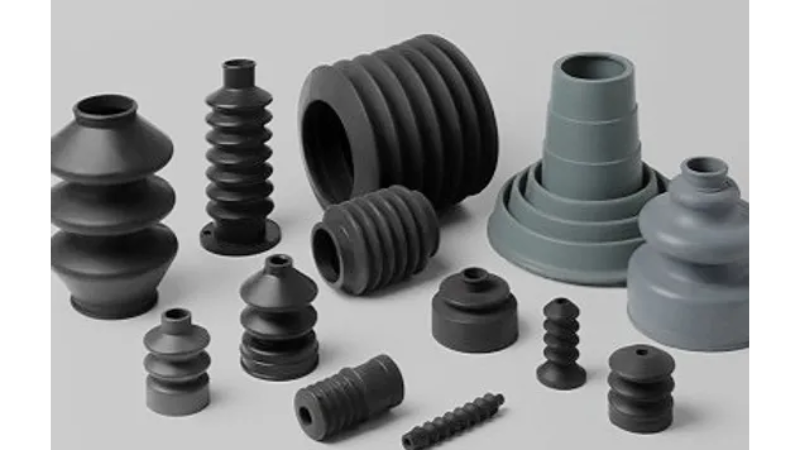
Silicone rubber is a versatile elastomer renowned for its exceptional properties, which make it ideal for various industrial applications. It is a polymorphic material with a unique chemical and mechanical combination.
Silicone stands out due to its distinctive properties, a key one being its exceptional resistance to extreme temperatures. Moreover, it can function seamlessly in a broad temperature range, from as low as -60°C to as high as 230°C, and can even endure temperatures up to 300°C for short durations.
As a result, this feature, coupled with its superior flexibility and elasticity, ensures that it maintains its structural integrity under various forms of stress.
Comparison with Other Rubber Materials
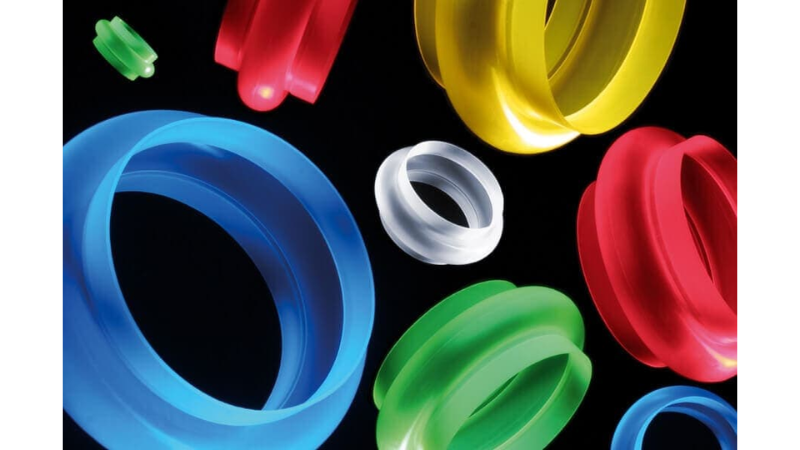
When distinguishing between different types of rubber, including natural rubber, EPDM rubber, and nitrile rubber, silicone stands out due to its unique attributes:
Praised for its flexibility and cost-effectiveness, natural rubber is frequently used in applications demanding high tear and tensile strength. But when it comes to resistance against high temperatures, oils, and certain chemicals, natural rubber falls short.
Its usual temperature tolerance lies between -50°C to 80°C, considerably less than the -60°C to 230°C range (and up to 300°C for short periods) managed by silicone.
Appreciated for its high resistance to fuels, oils, and specific chemicals, nitrile rubber is often selected for applications in the automotive and aeronautical sectors where oil and fuel resistance is critical.
However, compared to silicone, Nitrile rubber performs poorly under extreme temperatures, UV light, and ozone exposure. Its usual service temperature spans from -40°C to 120°C.
3. EPDM Rubber
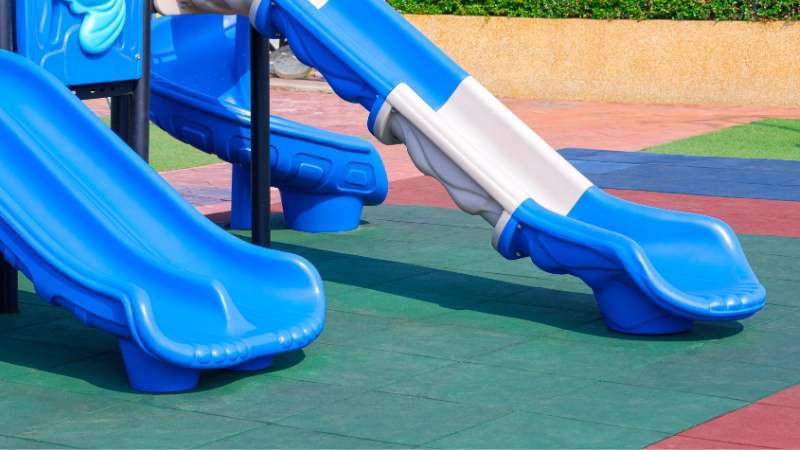
This synthetic rubber is resistant to UV, ozone, and weathering, much like silicone. It also offers excellent resistance to weak acids, alkalis, hot water, steam, and polar organic media. However, its resistance to fuel and oil is limited, and its temperature range (-45°C to 150°C) doesn’t quite measure up to that of silicone.
What Are Silicone Rubber Bellows?
Silicone molded rubber bellows are specialized components that are both flexible and expandable. Crafted from silicone, they serve a vital purpose in a myriad of industrial operations.
These bellows are meticulously designed to protect machine parts, safeguarding them from potentially damaging elements such as dust, moisture, and heat. Simultaneously, they are built to adapt to movement and alleviate stress during operation, thus contributing to the machinery’s overall efficiency and longevity.
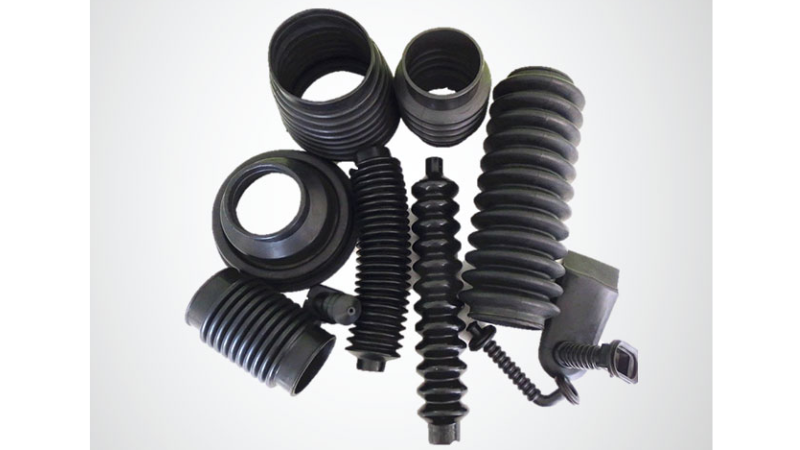
The following are key properties that make silicone bellows an invaluable asset in industries such as automotive, aerospace, medical, and manufacturing:
- Durability: Silicone rubber bellows are recognized for their ability to withstand extreme conditions, maintaining their integrity over time.
- Flexibility: They can accommodate movement, expanding and contracting as required without losing their original shape.
- Resilience: Silicone bellows resist environmental stressors like UV rays, ozone, and harsh weather conditions.
- Heat Resistance: They can tolerate high temperatures, making them suitable for heat exposure applications.
- Chemical Resistance: Being chemically inert, silicone bellows are resistant to most oils and chemicals, enhancing their durability in varied environments.
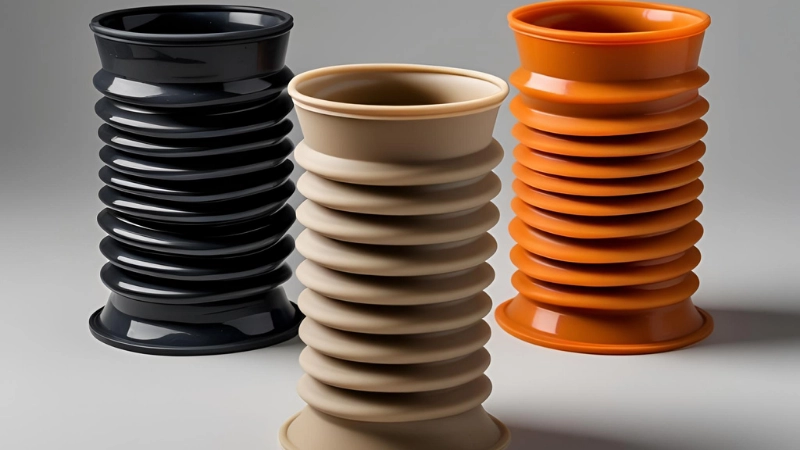
Industry Applications of Silicone Rubber Bellows
A variety of industries use silicone bellows for their unique properties and durability. Here are some of the applications of silicone bellows in different sectors:
For instance, in the medical industry, silicone bellows help in the functionality of medical devices such as pumps and valves for their ability to withstand high temperatures and chemical resistance.
Similarly, in the electronics industry, silicone bellows serve as protection against dust and debris in sensitive electronic equipment, including microphones and speakers.
Additionally, silicone molded rubber bellows are used in exhaust systems to absorb thermal expansion or rubber expansion joint and contraction, protecting the system from damage and extending its lifespan.
In the aerospace industry, silicone bellows are used in fuel and hydraulic systems due to their high precision and flexibility, ensuring safe and reliable operation in extreme conditions.
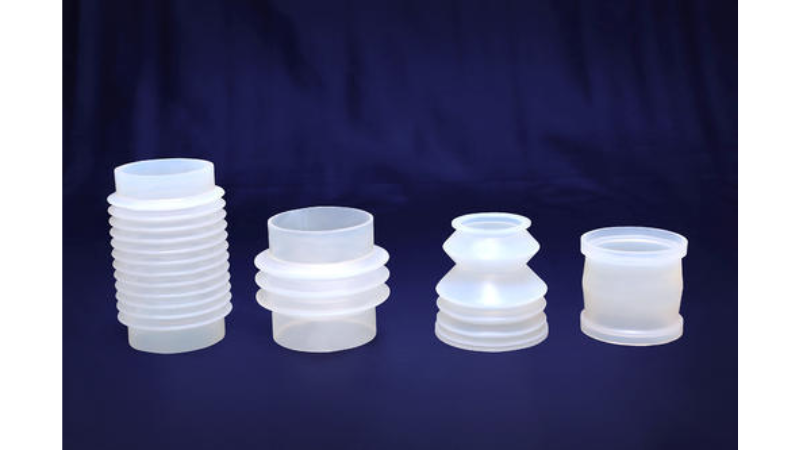
Silicone bellows’ versatility and durability make them an ideal choice for applications in various industries, offering long-term benefits and increased efficiency.
Comparison With Conventional Rubber Compression Molding
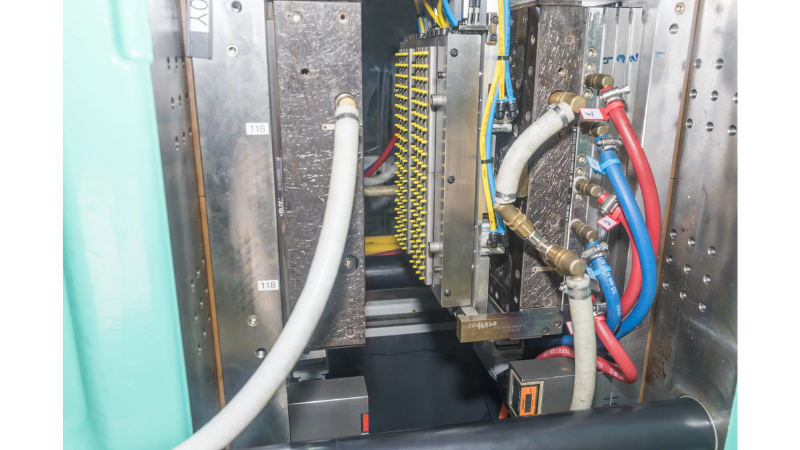
When comparing liquid injection molding to the conventional rubber compression molding process in the production of silicone rubber bellows, a few key benefits stand out:
- Material Distribution: Liquid injection molding ensures a more uniform distribution of material.
- Reduced Waste: This method helps minimize material waste during production.
- Quality: It often results in fewer defects, leading to a higher-quality end product.
What are the Common Reasons for the Failure of the Bellows
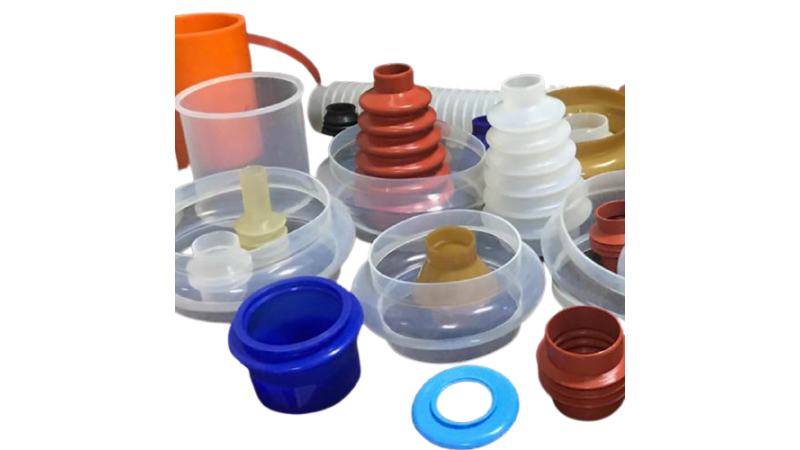
Bellows, including those made from silicone, can fail for a variety of reasons:
- Bacterial Growth: Bacteria can degrade the material over time, reducing the performance and lifespan of the bellows.
- High Heat: While silicone can withstand high temperatures, prolonged exposure to extreme heat can cause the material to degrade and potentially fail.
- Environmental Exposure: Exposure to harsh environmental elements like UV radiation, ozone, or corrosive chemicals can lead to material degradation and failure.
- Mechanical Stress: Excessive mechanical stress, including over-expansion or compression, can lead to structural failure.
- Improper Installation: Incorrect installation or misalignment can cause premature failure.
Best Practices for Enhanced Durability
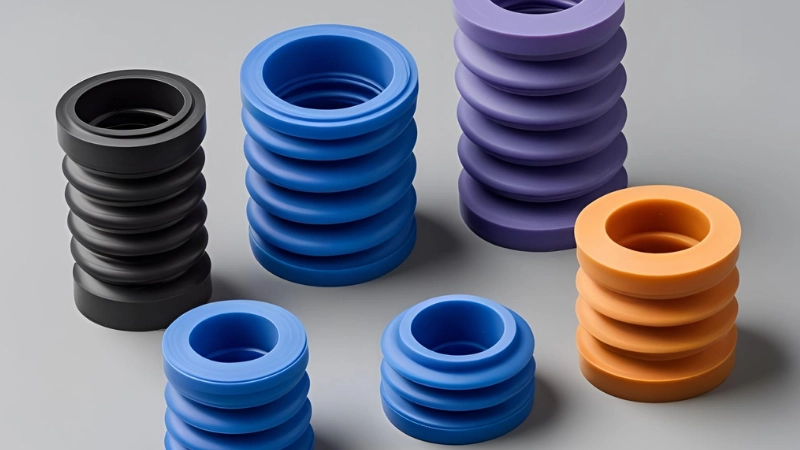
The longevity and performance of silicone rubber bellows significantly depend on the best practices implemented during their production and usage. Adherence to these practices ensures a high-quality end product and maximizes its functional life.
Leverage the Advantages of Silicone in Production
Thanks to its inherent properties, silicone is a standout material in the production of bellows. Its resistance to heat, flexibility, and chemical inertness translate into enhanced durability in the final product, making silicone rubber bellows a preferred choice in demanding industrial applications.
Improve Mold Design
The design of the mold plays a critical role in determining the tensile strength and durability of silicone bellows. Careful considerations, such as incorporating optimal wall thickness and reinforcing structures, can significantly enhance the performance and lifespan of the bellows.
An effective mold design ensures that the bellows can withstand the rigorous demands of their operational environments without compromising their functionality.
Innovate in the Production Process
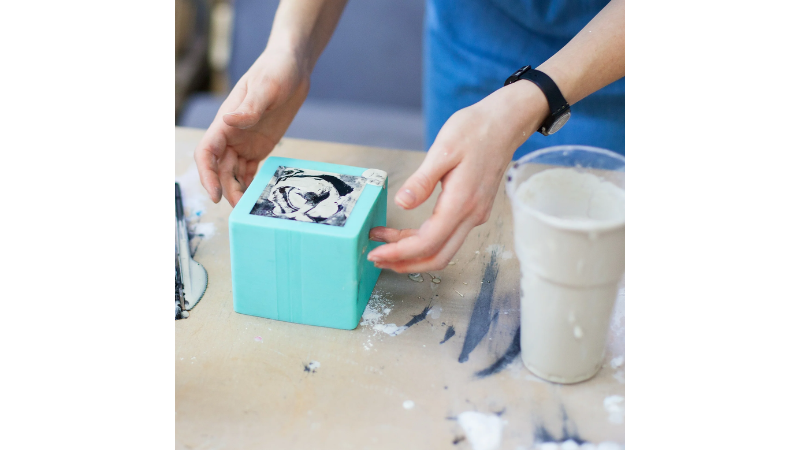
In the realm of production processes, innovative techniques such as the liquid injection molding process offer substantial benefits. This method ensures a uniform distribution of the silicone material, reducing material degradation and defects.
Especially when compared to compression molding, injection molding enhances the overall durability of the silicone rubber bellows, extending their functional life.
Strategies for Prolonging the Lifetime of Silicone Rubber Bellows
Maintaining the operational efficiency of silicone bellows over time requires a dedicated approach:
- Regular maintenance routines are vital. They help identify and rectify potential issues early, preventing failures.
- Regular cleaning is necessary to avoid the accumulation of debris that can compromise the bellows’ performance.
- Using suitable greases maintains the bellows’ flexibility and reduces wear, enhancing their functional life.
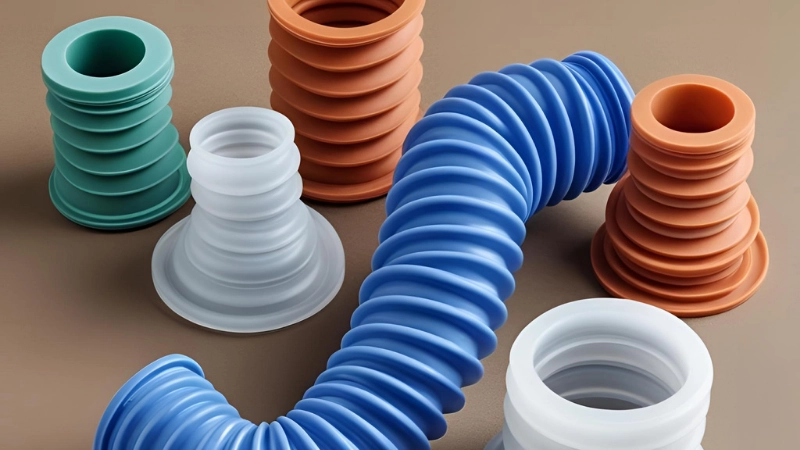
Why Proper Production And Maintenance Practices Are Essential
Ensuring the durability of silicone bellows lies heavily in proper production and maintenance practices. From selecting high-quality silicone material and precision in mold design to using advanced production techniques, every stage impacts the final product’s durability.
Post-production, consistent maintenance, regular cleaning, and appropriate use further extend the bellows’ lifetime, ensuring they function optimally and deliver value over time. By embracing these practices, businesses can enjoy the full benefits of silicone rubber bellows.
Conclusion
Due to their durability and flexibility, silicone rubber bellows are indispensable in various industries. To ensure their effectiveness and longevity, it’s crucial to focus on the best production and maintenance practices, including high-quality materials, precision mold design, and advanced production techniques.
At Hongju, we aim to provide insights and high-quality solutions that cater to your business needs, such as laser cutting and welding.
Unlock Your Business Potential with Our Superior Silicone Rubber Solutions
Hongju Silicone empowers your business with innovative silicone solutions. Our advanced materials enhance product performance while solving your toughest durability, temperature, and compliance challenges.
Contact us now to discover how our R&D expertise and custom formulations can optimize your applications!